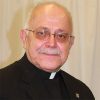The Conversion of Paul
On January 25 the Catholic, Anglican and Lutheran churches celebrate the conversion of St. Paul, arguably the most important event in the development of Christianity after the death and resurrection of Jesus and descent of the Holy Spirit. Paul expanded the identity and mission of followers of the Way from that of an obscure, albeit controversial, sect within Judaism to a dynamic and global religion.
Before his conversion, Saul of Tarsus was a Pharisee, a “separated one,” who preferred not to be contaminated by contact with the ritually unwashed masses. “Holier than thou” describes them perfectly. Like other Pharisees, Saul took great pride in keeping all 613 commandments of the Bible. In fact, he was so zealous in his love of the Law he committed himself to wiping out this group of Jews who followed the radical teachings of a crucified rabbi from Nazareth.
But, armed with arrest warrants and traveling to Damascus, Saul got knocked off his high horse by that crucified rabbi, Jesus of Nazareth, now risen from the dead. This experience transformed the zealous Saul into the even more zealous St. Paul, arguably the most ardent missioner in Christian history.
Interestingly, his conversion story as recorded in the Acts of the Apostles chapter 9 makes no mention of a horse. Still, the horse image emphasizes the powerful point: Saul changed only after he was brought low. To illustrate he had become a new person he changed his name from Saul to Paul. In his words, “I have been crucified with Christ. It is no longer I who live, but Christ who lives in me.” (Galatians 2:19–20)

Saul of Tarsus, who became Paul the Apostle, falls off his fabled horse in this statue at Our Lady of Guadalupe Church in Taichung,Taiwan.
The encounter on the road to Damascus profoundly shaped how Paul, and, by extension, we view Christ. Through Paul’s letters to various Christian communities, we understand who Jesus is, the meaning of his life, death and resurrection and how we are to live as followers of Christ.
Key elements of Christianity resulted from Paul’s conversion. In his letter to the Romans, Paul insists salvation occurred “while we were sinners.” When Christ appeared to him on that road to Damascus, Paul wasn’t praying. He was persecuting Christians. The vision left him temporarily blind but eventually it opened his eyes—physically and spiritually—to this truth: we are not saved by works of the Law but by grace.
Paul saw his newfound faith in Jesus not as a break with Judaism but as a fulfillment of it. Unlike all previous revelations to the Chosen People, Paul was convinced the new message of salvation was intended for all peoples, not just the Jews. It was this all-inclusive nature of God’s grace and mercy, where “there is now neither Jew or Greek, slave or free person, male or female; for you are all one in Christ Jesus” (Galatians 3:28) that religious leaders found so scandalous. Such a position resulted in Paul’s being expelled from synagogues and cities throughout the Mediterranean.
Paul’s conversion also gave him the inspiration that all Christians form the Body of Christ. Lying on the ground on that Damascus road, he heard a voice saying, “Saul, Saul, why do you persecute me?… I am Jesus, whom you are persecuting.” Paul realized something Matthew would later describe in his account of the Last Judgment: what we do to the least of our brothers and sisters, we do to Christ.
Ultimately this insight led Paul to become the “Apostle to the Gentiles.” He went from persecuting Christians to proclaiming the Gospel of Jesus Christ. Paul’s preaching, writings and ministry transformed Christianity into a truly universal (catholic) religion. We missioners who walk in the footsteps of Paul would do well to emulate his example and his vision. We invite people everywhere in the world to radical conversion: not necessarily a change of religion but more importantly a change of heart, toward God, daily. All of us Christians, who become missioners at baptism, do this most effectively by first doing it ourselves.
Featured Image: Saul of Tarsus, who became Paul the Apostle, falls off his fabled horse in this statue at Our Lady of Guadalupe Church in Taichung,Taiwan.

